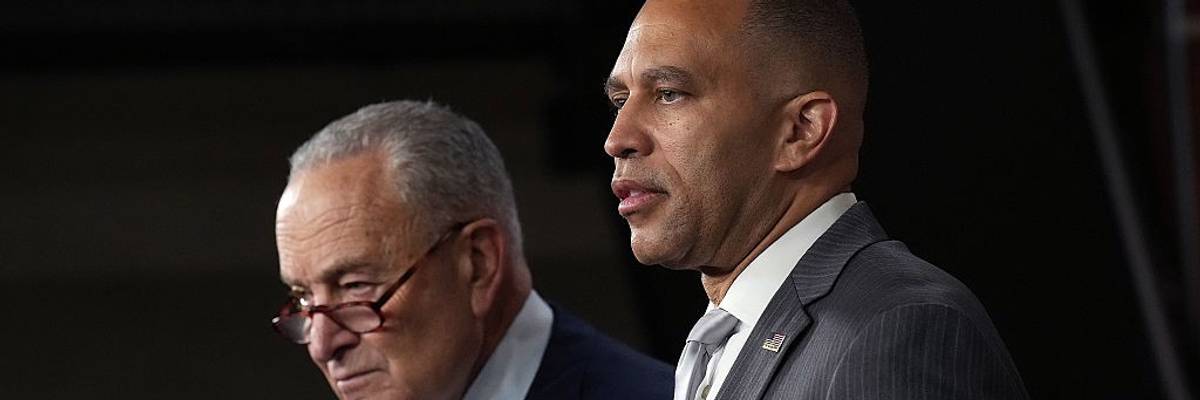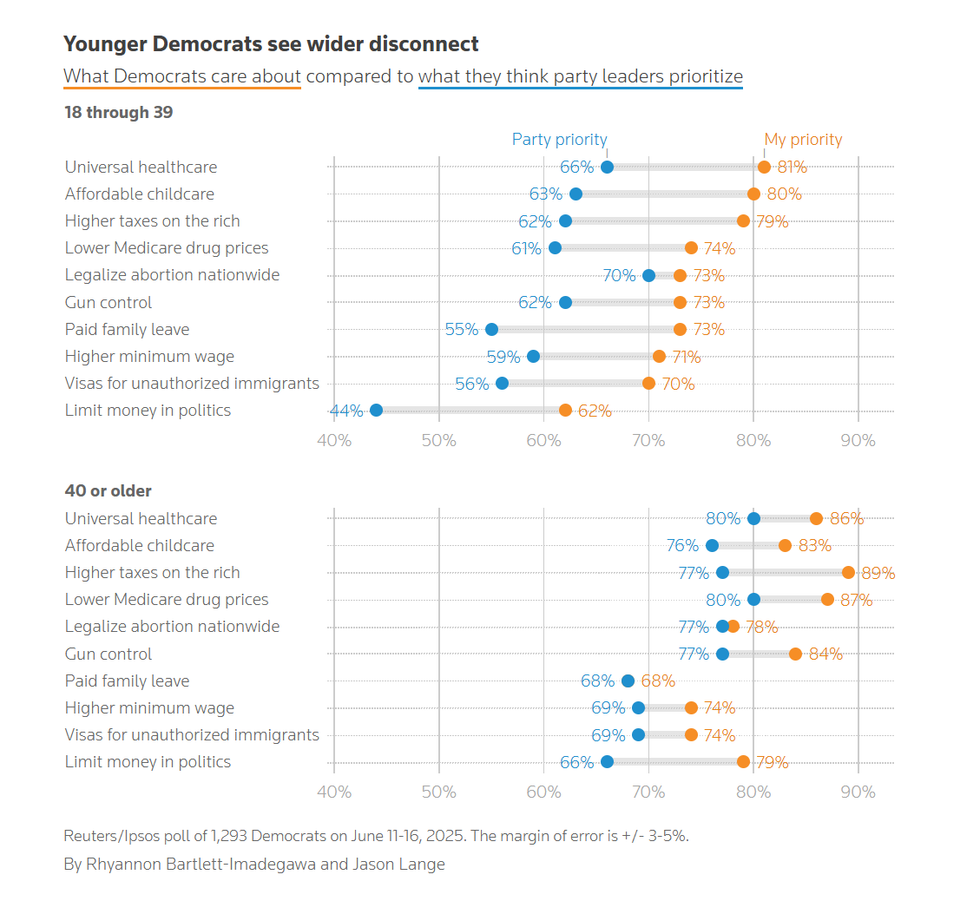

SUBSCRIBE TO OUR FREE NEWSLETTER
Daily news & progressive opinion—funded by the people, not the corporations—delivered straight to your inbox.
5
#000000
#FFFFFF
To donate by check, phone, or other method, see our More Ways to Give page.


Daily news & progressive opinion—funded by the people, not the corporations—delivered straight to your inbox.

U.S. Senate Minority Leader Chuck Schumer (D-N.Y.) and House Minority Leader Hakeem Jeffries (D-N.Y.) speak at a press conference in Washington, D.C. on June 11, 2025.
Voters described universal healthcare, affordable childcare, and higher taxes on the rich as top priorities in a new Reuters/Ipsos poll. But they were less likely to believe that party leaders shared those priorities.
Democratic voters want new leadership that will prioritize their day-to-day needs and do more to challenge corporate power, according to a poll published Thursday.
Sixty-two percent of the nearly 1,300 self-identified Democrats who responded to the new Reuters/Ipsos poll agreed with the statement that "the leadership of the Democratic Party should be replaced with new people," while just 24% wanted to keep the old guard around.
The new data delivers another blow to party leaders such as Senate Minority Leader Chuck Schumer (D-N.Y.) and House Minority Leader Hakeem Jeffries (D-N.Y.), who have faced growing scrutiny for failing to effectively oppose President Donald Trump in the eyes of their constituents.
The poll, conducted from June 11-16, revealed stark gaps between the agenda Democratic voters would like to see prioritized and what they perceive as party leadership's priorities. Voters overwhelmingly support populist economic policies, according to the data, but doubt that party leaders share those goals—with young voters especially skeptical.

Across all age groups, more than three-quarters of voters described universal healthcare, affordable childcare, and higher taxes on the rich as top priorities. But voters were less likely to believe that party leaders did as well.
Voters between ages 18 to 39 especially had a grim view of leadership. While 81% said they wanted universal healthcare, just 66% said they thought party leadership did too. On limiting money in politics, 62% said it was a priority, compared with just 44% who thought leadership felt the same.
Democrats over 40 were even more inclined to believe in top progressive agenda items. Although they perceived less of a divide between their views and those of party leaders, a significant gap remained.
Following Kamala Harris' defeat in the 2024 election, many corporate-friendly pundits embraced the narrative that voters perceived the Democratic policy agenda as too far left. But the Reuters/Ipsos poll suggests the opposite.
As Sharon Zhang wrote for Truthout, "The majority of federally elected Democrats actually oppose proposals like Medicare for All, and many party leaders have actively worked to sabotage support for such ideas," including Schumer, who declined to support Sen. Bernie Sanders' Medicare for All bill this year.
"Far from taxing the rich," she added, "party leaders have also cozied up to billionaires." Tech giants including Google, Microsoft, Amazon, and Apple all donated millions of dollars to the Harris campaign.
Ben Tulchin, a pollster for Bernie Sanders' 2016 and 2020 presidential campaigns, told Reuters that Democratic Party had "room for improvement" on showing Americans that they "are the ones standing up for working people."
"It needs to transform itself into a party that everyday people can get excited about," Tulchin said. "That requires a changing of the guard."
Dear Common Dreams reader, The U.S. is on a fast track to authoritarianism like nothing I've ever seen. Meanwhile, corporate news outlets are utterly capitulating to Trump, twisting their coverage to avoid drawing his ire while lining up to stuff cash in his pockets. That's why I believe that Common Dreams is doing the best and most consequential reporting that we've ever done. Our small but mighty team is a progressive reporting powerhouse, covering the news every day that the corporate media never will. Our mission has always been simple: To inform. To inspire. And to ignite change for the common good. Now here's the key piece that I want all our readers to understand: None of this would be possible without your financial support. That's not just some fundraising cliche. It's the absolute and literal truth. We don't accept corporate advertising and never will. We don't have a paywall because we don't think people should be blocked from critical news based on their ability to pay. Everything we do is funded by the donations of readers like you. Will you donate now to help power the nonprofit, independent reporting of Common Dreams? Thank you for being a vital member of our community. Together, we can keep independent journalism alive when it’s needed most. - Craig Brown, Co-founder |
Democratic voters want new leadership that will prioritize their day-to-day needs and do more to challenge corporate power, according to a poll published Thursday.
Sixty-two percent of the nearly 1,300 self-identified Democrats who responded to the new Reuters/Ipsos poll agreed with the statement that "the leadership of the Democratic Party should be replaced with new people," while just 24% wanted to keep the old guard around.
The new data delivers another blow to party leaders such as Senate Minority Leader Chuck Schumer (D-N.Y.) and House Minority Leader Hakeem Jeffries (D-N.Y.), who have faced growing scrutiny for failing to effectively oppose President Donald Trump in the eyes of their constituents.
The poll, conducted from June 11-16, revealed stark gaps between the agenda Democratic voters would like to see prioritized and what they perceive as party leadership's priorities. Voters overwhelmingly support populist economic policies, according to the data, but doubt that party leaders share those goals—with young voters especially skeptical.

Across all age groups, more than three-quarters of voters described universal healthcare, affordable childcare, and higher taxes on the rich as top priorities. But voters were less likely to believe that party leaders did as well.
Voters between ages 18 to 39 especially had a grim view of leadership. While 81% said they wanted universal healthcare, just 66% said they thought party leadership did too. On limiting money in politics, 62% said it was a priority, compared with just 44% who thought leadership felt the same.
Democrats over 40 were even more inclined to believe in top progressive agenda items. Although they perceived less of a divide between their views and those of party leaders, a significant gap remained.
Following Kamala Harris' defeat in the 2024 election, many corporate-friendly pundits embraced the narrative that voters perceived the Democratic policy agenda as too far left. But the Reuters/Ipsos poll suggests the opposite.
As Sharon Zhang wrote for Truthout, "The majority of federally elected Democrats actually oppose proposals like Medicare for All, and many party leaders have actively worked to sabotage support for such ideas," including Schumer, who declined to support Sen. Bernie Sanders' Medicare for All bill this year.
"Far from taxing the rich," she added, "party leaders have also cozied up to billionaires." Tech giants including Google, Microsoft, Amazon, and Apple all donated millions of dollars to the Harris campaign.
Ben Tulchin, a pollster for Bernie Sanders' 2016 and 2020 presidential campaigns, told Reuters that Democratic Party had "room for improvement" on showing Americans that they "are the ones standing up for working people."
"It needs to transform itself into a party that everyday people can get excited about," Tulchin said. "That requires a changing of the guard."
Democratic voters want new leadership that will prioritize their day-to-day needs and do more to challenge corporate power, according to a poll published Thursday.
Sixty-two percent of the nearly 1,300 self-identified Democrats who responded to the new Reuters/Ipsos poll agreed with the statement that "the leadership of the Democratic Party should be replaced with new people," while just 24% wanted to keep the old guard around.
The new data delivers another blow to party leaders such as Senate Minority Leader Chuck Schumer (D-N.Y.) and House Minority Leader Hakeem Jeffries (D-N.Y.), who have faced growing scrutiny for failing to effectively oppose President Donald Trump in the eyes of their constituents.
The poll, conducted from June 11-16, revealed stark gaps between the agenda Democratic voters would like to see prioritized and what they perceive as party leadership's priorities. Voters overwhelmingly support populist economic policies, according to the data, but doubt that party leaders share those goals—with young voters especially skeptical.

Across all age groups, more than three-quarters of voters described universal healthcare, affordable childcare, and higher taxes on the rich as top priorities. But voters were less likely to believe that party leaders did as well.
Voters between ages 18 to 39 especially had a grim view of leadership. While 81% said they wanted universal healthcare, just 66% said they thought party leadership did too. On limiting money in politics, 62% said it was a priority, compared with just 44% who thought leadership felt the same.
Democrats over 40 were even more inclined to believe in top progressive agenda items. Although they perceived less of a divide between their views and those of party leaders, a significant gap remained.
Following Kamala Harris' defeat in the 2024 election, many corporate-friendly pundits embraced the narrative that voters perceived the Democratic policy agenda as too far left. But the Reuters/Ipsos poll suggests the opposite.
As Sharon Zhang wrote for Truthout, "The majority of federally elected Democrats actually oppose proposals like Medicare for All, and many party leaders have actively worked to sabotage support for such ideas," including Schumer, who declined to support Sen. Bernie Sanders' Medicare for All bill this year.
"Far from taxing the rich," she added, "party leaders have also cozied up to billionaires." Tech giants including Google, Microsoft, Amazon, and Apple all donated millions of dollars to the Harris campaign.
Ben Tulchin, a pollster for Bernie Sanders' 2016 and 2020 presidential campaigns, told Reuters that Democratic Party had "room for improvement" on showing Americans that they "are the ones standing up for working people."
"It needs to transform itself into a party that everyday people can get excited about," Tulchin said. "That requires a changing of the guard."